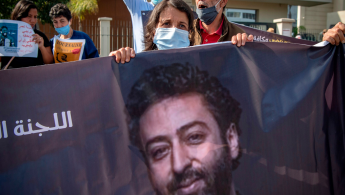On Eid al-Adha, Moroccan political prisoners' families launch hunger strike
In Morocco, while many are celebrating Eid al-Adha by cooking and sharing food with loved ones, families of prisoners of conscience have launched a 24-hour hunger strike as they are barred from visits during the holiday.
For six years, each Eid Al-Adha, Zoulikha, mother of the Hirak Rif prisoner Nasser Zefzafi, has stood on the house's roof in her black dress holding up Nasser's picture in mourning of his absence. She is often surrounded by black flags - a symbol of the absence of joy in the house.
"Zulekha pays the price of her steadfastness with sadness. For the sixth time, instead of slaughtering the Eid sacrifice, she raises [black] flags indicating the loss of a part of her," wrote Ahmed Zefzafi, the father of Nasser in a Facebook post.
Nasser Zefzafi was a charismatic leader of the Hirak Rif protests that erupted through the mountainous region of Rif in 2016. Zefzafi and thousands of Rifis called for justice, an end to corruption and better treatment for Rifis.
In 2017, Moroccan authorities launched a campaign of mass arrests, including the arrest of the movement’s leader Nasser Zefzafi.
According to estimates by activists, eight detainees from the Hirak region remain in Moroccan prisons, most notably Nasser Zefzafi and Nabil Ahamjik. Both were sentenced to 20 years for "serving a separatist agenda and conspiring to harm state security."
460 km away from the Rif, in the capital Rabat, the family of journalist Omar Radi is facing a similar tragedy.
"These initiatives are messages to officials to evaluate their policies in the field of freedom of expression and human rights," wrote Driss Radi, father of Omar, in a Facebook post.
The parents of the journalist, who are also outspoken activists for freedoms and democracy, launched their own hunger strike from the headquarters of the Moroccan Association of Human Rights in Rabat.
Radi, a 35-year-old Moroccan freelance investigative journalist known as a vocal critic of the authorities, was sentenced in April to six years in prison on espionage and rape charges.
Radi has insisted on his innocence throughout his two-year-long trial.
Hunger strike of political detainees’ families and friends in Morocco on Aladha Eid day pic.twitter.com/Vk4YdyzfYh
— Maati Monjib (@MMonjib) July 8, 2022
Accompanied by Maati Mounjib, another Moroccan journalist who was recently a victim of "an unjust trial" according to Amnesty International, and tens of human rights activists, they all announced that they too will join Radi's parents in their hunger strike to spotlight "the repression of freedom of speech in the kingdom".
From her "exile of choice", Moroccan journalist Hajar Raissouni also joined the symbolic hunger strike in protest of the detention of her brother Souleiman Raissouni.
In February, the Casablanca Court of Appeal sentenced Soulaiman Raissouni to five years’ imprisonment and 100,000 dirhams (approximately 10,000 dollars) in compensation to the complainant for "indecent assault with violence and sequestration." A charge he denies.
In 2019, Hajar Raissouni, a Moroccan journalist known for her criticism of the authorities, was arrested for allegedly having an illegal abortion and having sex out of wedlock, two punishable "crimes" according to Moroccan law.
The journalist was soon freed after receiving a royal pardon. Since then, she left Morocco and launched the NGO "Khmissa" to defend women's rights, individual freedoms and the freedom of the press.
#FreeSoulaimanRaissouni pic.twitter.com/Z4U93dkb3Y
— هاجر الريسوني hajar raissouni (@hajarraissounu) July 10, 2022
Reporters Without Borders (RSF) said the trials of the two journalists – Sulaiman, and Omar – were marred by "countless irregularities and their detention is arbitrary."
RSF has called for their immediate and unconditional release.
On the occasion of Eid, Morocco’s King Mohammed VI granted a pardon to 979 inmates, including 11 prisoners convicted of terrorism and extremism, who have shown that they no longer hold extremist views and are ready to be reintegrated into society.
The list did not include any members of Hirak Rif protesters or the recently arrested activists and journalists.





 Follow the Middle East's top stories in English at The New Arab on Google News
Follow the Middle East's top stories in English at The New Arab on Google News


